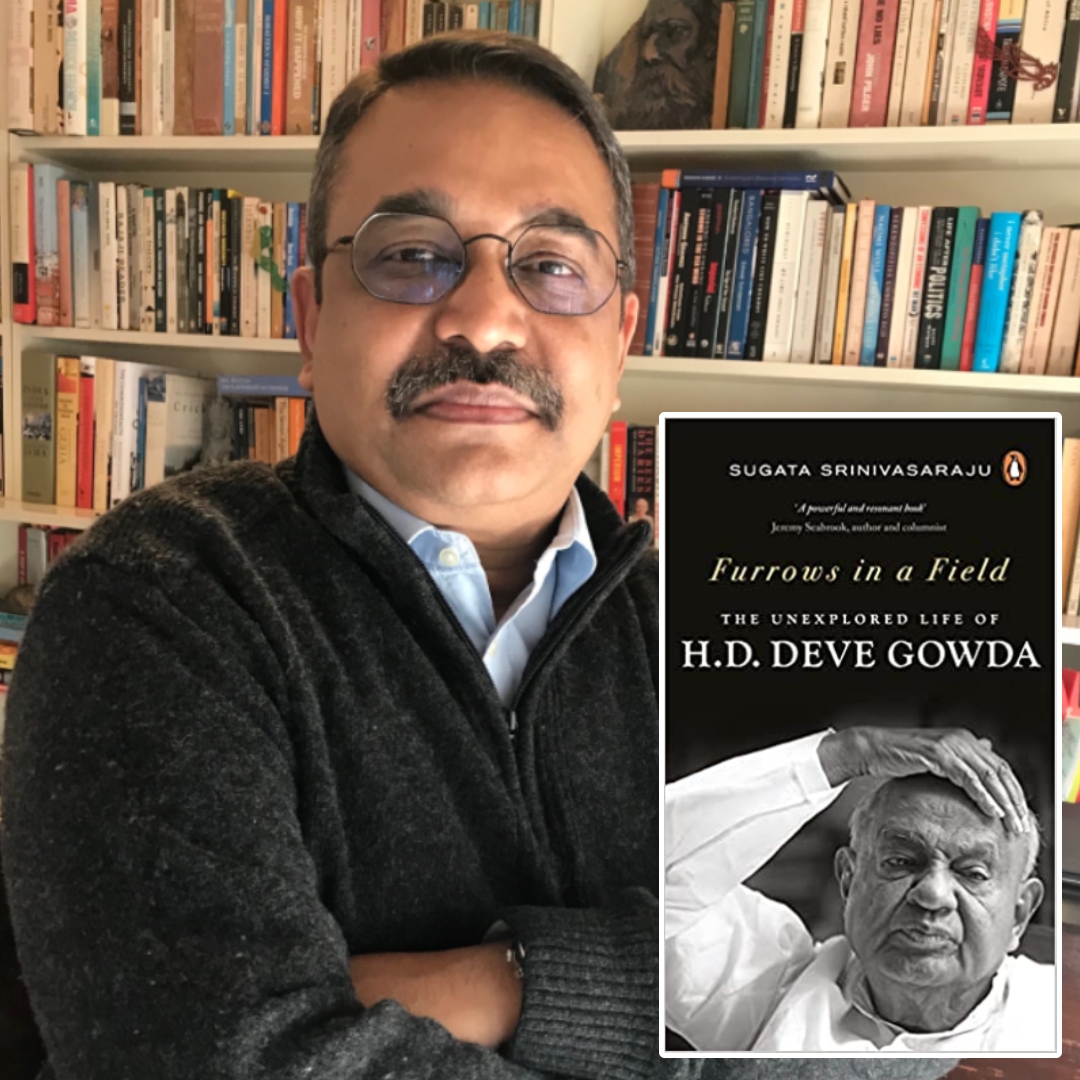
Image Credits: From The Source
TLI Exclusive: Here's How Sugata Srinivasaraju's Biography On HD Deve Gowda Throws Spotlight On His Remarkable Legacy
Karnataka, 24 April 2022 10:50 AM GMT | Updated 25 April 2022 7:13 AM GMT
Editor : Shiva Chaudhary |
A post-graduate in Journalism and Mass Communication with relevant skills, specialising in content editing & writing. I believe in the precise dissemination of information based on facts to the public.
Creatives : Akanksha Saxena
I am a budding journalist who loves to write stories that have the ability to connect with people.
The renowned journalist-author maps HD Deve Gowda's journey, from his early days in Karnataka to becoming the country's Prime Minister, in his book appropriately titled 'Furrows In A Field.'
Haradanahalli Doddegowda Deve Gowda, popularly known as HD Deve Gowda, is known for being India's 11th Prime Minister between 1996 and 1997. His growth from being Karnataka's chief minister to governing the Indian populace has been remarkable.
HD Deve Gowda's name is synonymous with that of India's 'son of the soil' politics. However, his personal and political journey is relatively unknown, and not many know about his achievements as a seasoned politician that brought about a change in the country's political dynamics.
A renowned journalist and author named Sugata Srinivasaraju writes about his life in a biography called 'Furrows In A Field.' He speaks to The Logical Indian about penning down his journey for the world to know about.
1. What made you choose HD Deve Gowda as your subject for the biography?
I think that is a slightly unfair question. Gowda was India's prime minister and was, in his way, responsible for altering the destiny of this nation. He responded to its hopes and aspirations. Besides being a PM, he has been in public life for nearly seven decades, and that should make him an eminent subject of a biography. Perhaps, we should ask why there was no biography of Deve Gowda even a quarter-century after he stepped down as PM. This question would not have been asked if I had chosen a Nehru, an Indira Gandhi or even a Narendra Modi. India is such a vast and diverse country, but we seem to be interested in only a handful of people.
This aside, one of the principal reasons that made me interested in Gowda was the current political context. There is an impulse to centralise everything. There is an impulse to argue for one India, one history, one culture, one religion, one language and one big leader. There is a great conspiracy to present this nation as a homogenous and flat cultural space.
There are simplistic binaries that are getting further established or renewed (Hindi versus English, BJP versus Congress, Hindu versus Muslim, North versus South etc.). In this context, Gowda, for me appeared like a national champion, a metaphor for our nation's true federal character. His deep democratic engagement was fascinating, and he was an engineer-prime minister with big ideas. To explore his life was to remind the world that India was a union of states, a grand and permanent coalition of various ideas, habits, cultures, foods, languages, ethnicities etc.
Plus, secularism and liberalism in India as opposed to communalism and bigotry, were being defined by a small group of anglophone elites. Gowda was an alternate liberal and secular idea too. His secularism was organic and unpretentious. It was not the deracinated Congress model. All this made me study Gowda seriously.
2. When you first approached Mr Deve Gowda for the book, what was his initial reaction?
He was deeply suspicious. He thought this would be another attempt to accuse him. My persistence for about six months worked. He began to trust the professional process slowly, and the interview sessions became very interesting. In my first meeting, I told him two things: One, if he gave me time and explained his life, the book would be enriched. However, the book would still be written if he did not speak to me. Two, I will not show him anything I write. There was no approval-seeking for the manuscript. He'll have to read the book like any other reader after publication. He gave me time, and he never sought to scrutinise the manuscript. Also, he did not object to anything after the book was published. He came across as very detached. That is rare and democratic. How many politicians do this?
3. While researching, what kind of information fascinated you about his political or personal life?
Almost all the material fascinated me. Gowda's political battles were somewhat familiar but his work, especially his vision for the North East and Kashmir, his deep involvement with the rivers of India, his deep knowledge of river basin planning, his encyclopaedic grasp of agricultural practices, his understanding of the law and democratic traditions were all fascinating to discover in the lonely corner of libraries and the archives.
The one thing that made me sit up was when I read about his backchannel engagement with Nawaz Sharif, the then Pakistan prime minister, through his surgeon. Also, to learn about how he went incognito to meet Naga rebels in Zurich on his way to Davos was thrilling. These moments of discovery made me feel that the biography project was worthwhile and that I was restoring the balance of a biased streak in our contemporary history.
I should admit that I looked for his girlfriends but found none about his personal life. Some of his colleagues and contemporaries were notorious for having many flings and establishments. But even his worst enemies said he never dropped his guard and was deeply religious and faithful to his wife. In this sense, he was very, very dull. But even without this 'masala' the book has done well.
4. What was the reason behind naming your book 'Furrows In A Field'?
It is a metaphor that resonates with a life that is so profoundly connected with agriculture and is so deeply rooted. An agricultural field also speaks to us about the uncertainties of life, but at the same time, it is about hope and struggles. It is about starting afresh each time a harvest has been done or a lost crop. In the context of Gowda, it represents the ups and downs of his long political life. Gowda is a great believer in astrology; the 'furrows', therefore could also mean lines of destiny. I settled with this title because it captured my subject most effectively. It was unpretentious like him.
5. The country saw the rise in Kisan-centric politics with the farmers' protest in North India. However, it fizzled out due to BJP's victory in the Assembly Elections. Looking at Deve Gowda's emphasis on the same in the 90s, were there specific ways that could have worked in the current scenario?
I don't think so. I was deeply sceptical. We live in a totally different time. As a nation, we have transitioned. Agriculture is no longer at the centre of our economic thinking. The opening up of our economy in 1991 altered our economic worldview and our political, social, and cultural perceptions. For instance, the way we look at land changed. From being an inheritance that you pawned and passed on from one generation to another, it became real estate which fetched a reasonable price. Technology and communication changed how one constructed mass politics.
Kisan politics is still important, but the outcomes it seeks are different. It now has a particular professional agenda. The 'kisan' identity that existed earlier, before the 1990s, was a cultural one. It drove nationalism and nation-building. The farmer had pride of place in the national firmament. He was seen as someone who fed a nation. He was much more than a tiller of the soil and a harvester of grains. He was a keeper of your culture and values. Now, farmers do not provoke or determine passions anymore.
Deve Gowda too, in his time, combined Kisan politics with a variety of things to become electorally attractive. Even in his time, people who were only Kisan leaders did not make it very big in the power game, although they had a big presence. Gowda shrewdly used the Kisan branding to build a more extensive base. He was shrewder than Charan Singh in this aspect. Besides agriculture, Gowda had big development ideas. He was not dogmatic and restricted. In other words, he was not a one-trick pony. This aspect comes out rather elaborately in the book.
6. What are some of the aspects of HD Deve Gowda as Karnataka's CM that are relatively unknown about him?
Although his term got truncated because he was elevated as prime minister, he was a very successful chief minister. His fine achievements as a chief minister include creating a great resettlement and rehabilitation package for a very big dam project on the Krishna river. This became so popular in the World Bank in the 90s that it was informally referred to as the Gowda package. Many Asian countries benefitted from what he had done in the Krishna basin.
He was also responsible for creating infrastructure for an IT industry that was to boom in Karnataka in a few years. That included IT parks and a brand new airport. He was the first to conceive a 33 per cent reservation for women before he took it to the national space as prime minister.
He also introduced gender-based reservations in local bodies. In the communal space, he not only solved the Idgah Maidan controversy peacefully but gave Muslims reservations under the backward class category. His achievements were many. If he had stayed back in Karnataka, he would have served the state as a long term chief minister. Just like a Jyoti Basu, who forced him to be prime minister. Gowda's achievement as opposition leader to the mighty Devaraj Urs was also stellar.
7. In your opinion, what is the biggest drawback of Deve Gowda and his politics? Do you think his methods would have worked in the current political climate?
Gowda has still not retired from politics, so I guess his methods must be working, or he is constantly trying to improve upon them. One of his biggest drawbacks has been to underestimate himself constantly. That lack of confidence in himself led to many complications in the public perception of his work. The other thing common to many political patriarchs of India is that they have become dynastic. Also, he should have retained his splendid national imagination even after he stepped down as prime minister. He was a terrific prime minister.
8. Before becoming an author, you were a journalist for close to 25 years. What was the transformation from a journalist to an author like? Was it relatively easy or did it take some time to adjust?
I am still a journalist. I am a member of the Editors Guild of India. I write columns for mainstream media and advise niche digital media startups. I see the world as a journalist. And I have been an author even while I was reporting for and editing newspapers. I see one as the extension of the other. Journalism and writing are seamless in my mind. There is an excellent tradition of journalist-writers, and I have always desired to be part of that tradition. I have had excellent role models like Hemingway, Orwell, Marquez, Ved Mehta, Vinod Mehta and P Lankesh.
9. In the future, what is the topic you want to venture into for your next book?
There are many themes I want to explore at the intersection of culture and politics in the long term. But in the immediate future, I plan to write about a new, unexplored aspect of the Emergency that Indira Gandhi imposed in 1975.
Also Read: After 25 Years, Women Reservation Bill Still Far From Reality In India
 All section
All section














